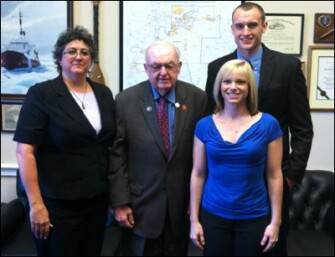
As part of the National Association of Sport and Physical Education’s (NASPE) “Speak Out! Day,” phys. ed. advocates descended on Capitol Hill today to push for more federal support, fresh off the release of the Government Accountability Office’s report on K-12 sports and phys. ed. opportunities.
The GAO report, which drew some criticism from experts due to the datedness of its data, suggested that schools weren’t devoting as much time to phys. ed. as they did earlier this decade. However, despite the decrease in the amount of time devoted to phys. ed., the quality of those phys. ed. programs appeared to be on the rise, the GAO suggested.
The GAO also discovered that budget cuts in recent years were having an adverse effect on schools being able to offer quality phys. ed. programs, according to officials at many of the schools the GAO visited. While the federal Carol M. White Physical Education Program (PEP) was spared in the fiscal 2012 budget, congressional across-the-board cuts known as sequestration could be less than a year away for schools.
With that in mind, phys. ed. advocates spent five hours today meeting with congressional delegates to lobby for the federal government continuing to make physical wellness a priority in schools. Given that medical costs related to obesity totaled around $147 billion in the U.S. in 2008, according to the U.S. Centers for Disease Control and Prevention, the stakes are clear.
What was the goal of the day? We can surmise at least one, based on what Julie Jahn, assistant professor of physical education at Eastern Michigan University, tweeted earlier today:
So far good meetings with U.S. legislators. Sharing the need for #physed to be defined as a core subject! #naspe #SPEAKOUT2012
— Julie Jahn (@professor_julie) March 29, 2012
During lunch today, NASPE recognized Sen. Bob Casey (D-Pa.) and Rep. Jim Gerlach (R-Pa.) for their commitment to school-based physical education. Casey introduced an amendment to the reauthorization of the Elementary and Secondary Schools Act that calls for a “well-rounded education,” while Gerlach was one of the original sponsors of the FIT Kids Act.
Protecting Phys. Ed. Funding
One of the major priorities of the day was to ensure that funding for the PEP remained a stand-alone item in the federal budget, according to Billy Beltz, marketing director for SPARK, a research-based phys. ed. organization.
In the Senate’s proposed FY2013 budget, the PEP grants would be consolidated into a block grant, according to Beltz, meaning it would be lumped with other legislation, leaving states to pick and choose how they allocate money to each program.
“A state could actually choose to put no money toward P.E.,” he said, “and we know that that will happen. If P.E. is combined with all these other subjects, with the pressure that schools have, the money does not go to P.E.”
The House’s current FY2013 budget eliminates PEP funding altogether, according to Beltz.
Kymm Ballard of SPARK attended the events on Capitol Hill today, Beltz said, to encourage lawmakers to understand the importance of phys. ed. Not only has research repeatedly linked physical activity and academic success, but students who participate in P.E. have been shown to be more likely to participate in physical activity outside of school and as adults, he said.
“You have to provide quality P.E. from kindergarten through 12th grade,” Beltz said, “because the skills that they’re learning that will help them become lifelong lovers of activity are always changing.”
Photo: Kymm Ballard from SPARK, Rep. Howard Coble (R-N.C.), Matt James, a student-teacher from Western Carolina University, and Kacey DiGiacinton, a teacher educator from Elizabeth City State University, meet March 29 on Capitol Hill as part of NASPE’s Speak Out! Day. (Betsy Huffine, Executive Assistant/Legislative Assistant to Rep. Coble.)